Latest Sheet Music
Johann Pachelbel

Johann Pachelbel (pronounced /ˈpækəlbɛl/, /ˈpɑːkəlbɛl/, or /ˈpɑːkəbɛl/; baptized September 1, 1653 – buried March 9, 1706) was a German Baroque composer, organist and teacher, who brought the south German organ tradition to its peak. He composed a large body of sacred and secular music, and his contributions to the development of the chorale prelude and fugue have earned him a place among the most important composers of the middle Baroque era.
Pachelbel's work enjoyed enormous popularity during his lifetime; he had many pupils and his music became a model for the composers of south and central Germany. Today, Pachelbel is best known for the Canon in D, the only canon he wrote - although a true canon at the unison in three parts, it is often regarded more as a passacaglia, and it is in this mode that it has been arranged and transcribed for many different media. In addition to the canon, his most well-known works include the Chaconne in F minor, the Toccata in E minor for organ, and the Hexachordum Apollinis, a set of keyboard variations.
Pachelbel's music was influenced by southern German composers, such as Johann Jakob Froberger and Johann Kaspar Kerll, Italians such as Girolamo Frescobaldi and Alessandro Poglietti, French composers, and the composers of the Nuremberg tradition. Pachelbel preferred a lucid, uncomplicated contrapuntal style that emphasized melodic and harmonic clarity. His music is less virtuosic and less adventurous harmonically than that of Dieterich Buxtehude, although, like Buxtehude, Pachelbel experimented with different ensembles and instrumental combinations in his chamber music and, most importantly, his vocal music, much of which features exceptionally rich instrumentation. Pachelbel explored many variation forms and associated techniques, which manifest themselves in various diverse pieces, from sacred concertos to harpsichord suites.
Pachelbel's work enjoyed enormous popularity during his lifetime; he had many pupils and his music became a model for the composers of south and central Germany. Today, Pachelbel is best known for the Canon in D, the only canon he wrote - although a true canon at the unison in three parts, it is often regarded more as a passacaglia, and it is in this mode that it has been arranged and transcribed for many different media. In addition to the canon, his most well-known works include the Chaconne in F minor, the Toccata in E minor for organ, and the Hexachordum Apollinis, a set of keyboard variations.
Pachelbel's music was influenced by southern German composers, such as Johann Jakob Froberger and Johann Kaspar Kerll, Italians such as Girolamo Frescobaldi and Alessandro Poglietti, French composers, and the composers of the Nuremberg tradition. Pachelbel preferred a lucid, uncomplicated contrapuntal style that emphasized melodic and harmonic clarity. His music is less virtuosic and less adventurous harmonically than that of Dieterich Buxtehude, although, like Buxtehude, Pachelbel experimented with different ensembles and instrumental combinations in his chamber music and, most importantly, his vocal music, much of which features exceptionally rich instrumentation. Pachelbel explored many variation forms and associated techniques, which manifest themselves in various diverse pieces, from sacred concertos to harpsichord suites.
Hairspray

Hairspray is a 2007 musical film produced by Zadan/Meron Productions and distributed by New Line Cinema. It was released in the United States, Canada, and the United Kingdom on July 20, 2007. The film is an adaptation of the Tony Award-winning 2002 Broadway musical of the same name, and a remake of John Waters' 1988 comedy film of the same name. Set in 1962 Baltimore, Maryland, the film follows a "pleasantly plump" teenager named Tracy Turnblad as she simultaneously pursues stardom as a dancer on a local TV show and rallies against racial segregation.
Adapted from both Waters's 1988 script and Thomas Meehan and Mark O'Donnell's book for the stage musical by screenwriter Leslie Dixon, the 2007 film version of Hairspray is directed and choreographed by Adam Shankman. Hairspray stars John Travolta, Michelle Pfeiffer, Christopher Walken, Amanda Bynes, James Marsden, Queen Latifah, Brittany Snow, Zac Efron, Elijah Kelley, Allison Janney, and introduces newcomer Nikki Blonsky as Tracy Turnblad. Hairspray features songs from the Broadway musical written by Marc Shaiman and Scott Wittman, as well as four new Shaiman/Wittman compositions not present in the original Broadway version.
Opening to mostly positive reviews, Hairspray met with financial success, breaking the record for biggest sales at opening weekend for a movie musical, which the film held until July 2008 when it was surpassed by Mamma Mia!. Hairspray went on to become the fourth highest grossing musical film in U.S. cinema history, behind the film adaptations of Grease, Chicago, and Mamma Mia!. Available in a variety of formats, Hairspray's Region 1 home video release took place on November 20, 2007. The USA Network has purchased the broadcast rights to Hairspray and is scheduled to debut the film on cable television in February 2010.
Adam Shankman and John Waters are currently working on a sequel to the film.
Adapted from both Waters's 1988 script and Thomas Meehan and Mark O'Donnell's book for the stage musical by screenwriter Leslie Dixon, the 2007 film version of Hairspray is directed and choreographed by Adam Shankman. Hairspray stars John Travolta, Michelle Pfeiffer, Christopher Walken, Amanda Bynes, James Marsden, Queen Latifah, Brittany Snow, Zac Efron, Elijah Kelley, Allison Janney, and introduces newcomer Nikki Blonsky as Tracy Turnblad. Hairspray features songs from the Broadway musical written by Marc Shaiman and Scott Wittman, as well as four new Shaiman/Wittman compositions not present in the original Broadway version.
Opening to mostly positive reviews, Hairspray met with financial success, breaking the record for biggest sales at opening weekend for a movie musical, which the film held until July 2008 when it was surpassed by Mamma Mia!. Hairspray went on to become the fourth highest grossing musical film in U.S. cinema history, behind the film adaptations of Grease, Chicago, and Mamma Mia!. Available in a variety of formats, Hairspray's Region 1 home video release took place on November 20, 2007. The USA Network has purchased the broadcast rights to Hairspray and is scheduled to debut the film on cable television in February 2010.
Adam Shankman and John Waters are currently working on a sequel to the film.
Dire Straits

Dire Straits were an English rock band, formed in 1977 by Mark Knopfler (guitar and vocals), his brother David Knopfler (guitar), John Illsley (bass), and Pick Withers (drums), and subsequently managed by Ed Bicknell. Although the band was formed in an era when punk rock reigned, Dire Straits worked within the conventions of classic rock, albeit with a stripped-down sound that appealed to modern audiences weary of the overproduced stadium rock of the 1970s. In their early days, Mark and David requested that pub owners turn down the amps so that patrons could converse while the band played — indicative of their unassuming demeanor. Despite this oddly self-effacing approach to rock and roll, Dire Straits soon became hugely successful, with their first album going multi-platinum globally.
The band's best-known songs include "Sultans of Swing", "Romeo and Juliet", "Tunnel of Love", "Telegraph Road", "Private Investigations", "Money for Nothing", "Walk of Life", "So Far Away", "Brothers in Arms" and "Calling Elvis".
Dire Straits and Mark Knopfler have sold in excess of 118 million albums to date.
The band's best-known songs include "Sultans of Swing", "Romeo and Juliet", "Tunnel of Love", "Telegraph Road", "Private Investigations", "Money for Nothing", "Walk of Life", "So Far Away", "Brothers in Arms" and "Calling Elvis".
Dire Straits and Mark Knopfler have sold in excess of 118 million albums to date.
Al Green

Albert Leornes Greene (born April 13, 1946), often known as The Reverend Al Green, is an American singer, songwriter and record producer; he is best known for recording a series of soul hit singles in the early 1970s, including "Take Me to the River", "Tired of Being Alone", "I'm Still in Love with You", "Love and Happiness", and his signature song, "Let's Stay Together". After an incident in which his girlfriend died by suicide, Green became an ordained pastor and turned to gospel music. He later returned to secular music.
Baden Powell

Baden Powell de Aquino (Brazilian Portuguese: ; 6 August 1937 – 26 September 2000), known professionally as Baden Powell, was a Brazilian guitarist. He combined classical techniques with popular harmony and swing. He performed in many styles, including bossa nova, samba, Brazilian jazz, Latin jazz and MPB. He performed on stage during most of his lifetime.
Elvis Costello
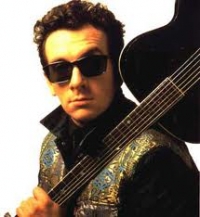
Elvis Costello (born Declan Patrick MacManus, 25 August 1954) is an English singer-songwriter. He came to prominence as an early participant in London's pub rock scene in the mid-1970s and later became associated with the punk/New Wave genre. Steeped in word play, the vocabulary of Costello's lyrics is broader than that of most popular songs. His music has drawn on many diverse genres; one critic described him as a "pop encyclopedia", able to "reinvent the past in his own image".
Costello has won multiple awards in his career, including a Grammy Award, and has twice been nominated for the Brit Award for Best British Male. In 2003, Elvis Costello & the Attractions was inducted into the Rock and Roll Hall of Fame. In 2004, Rolling Stone ranked Costello number 80 on their list of the 100 Greatest Artists of All Time.
Costello has won multiple awards in his career, including a Grammy Award, and has twice been nominated for the Brit Award for Best British Male. In 2003, Elvis Costello & the Attractions was inducted into the Rock and Roll Hall of Fame. In 2004, Rolling Stone ranked Costello number 80 on their list of the 100 Greatest Artists of All Time.
Freddie Mercury

Freddie Mercury (born Farrokh Bulsara, 5 September 1946 – 24 November 1991), was a British musician, best known as the lead vocalist of the rock band Queen. As a performer, he was known for his powerful vocals and flamboyant performances. As a songwriter, he composed many hits, including "Bohemian Rhapsody", "Killer Queen", "Somebody to Love", "Don't Stop Me Now", "Crazy Little Thing Called Love", "Barcelona", and "We Are the Champions". Led by Mercury, Queen had sold more than 300 million albums internationally by 2009.
In addition to his work with Queen, he also led a solo career and was occasionally a producer and guest musician (piano or vocals) for other artists. Mercury, who was a Parsi and grew up in India, has been referred to as "Britain's first Asian rock star". He died of bronchopneumonia induced by AIDS on 24 November 1991, only one day after publicly acknowledging he had the disease. In 2006, Time Asia named him as one of the most influential Asian heroes of the past 60 years, and he continues to be voted as one of the greatest singers in the history of popular music. In 2005, a poll organised by Blender and MTV2 saw Mercury voted the greatest male singer of all time (and second-greatest singer overall after Mariah Carey). In 2009, a Classic Rock poll saw him voted the greatest rock singer of all time. In 2008, Rolling Stone ranked him number 18 on their list of the 100 greatest singers of all time, reflecting the magazine's editorial opinion.
In addition to his work with Queen, he also led a solo career and was occasionally a producer and guest musician (piano or vocals) for other artists. Mercury, who was a Parsi and grew up in India, has been referred to as "Britain's first Asian rock star". He died of bronchopneumonia induced by AIDS on 24 November 1991, only one day after publicly acknowledging he had the disease. In 2006, Time Asia named him as one of the most influential Asian heroes of the past 60 years, and he continues to be voted as one of the greatest singers in the history of popular music. In 2005, a poll organised by Blender and MTV2 saw Mercury voted the greatest male singer of all time (and second-greatest singer overall after Mariah Carey). In 2009, a Classic Rock poll saw him voted the greatest rock singer of all time. In 2008, Rolling Stone ranked him number 18 on their list of the 100 greatest singers of all time, reflecting the magazine's editorial opinion.
Judas Priest
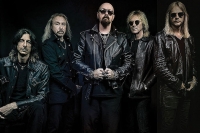
Judas Priest are an English heavy metal band formed in Birmingham in 1969. They have sold over 50 million copies of their albums, and are frequently ranked as one of the greatest metal bands of all time. Despite an innovative and pioneering body of work in the latter half of the 1970s, the band had struggled with indifferent record production and a lack of major commercial success until 1980, when they rose to commercial success with the album British Steel.The band's membership has seen much turnover, including a revolving cast of drummers in the 1970s and the departure of singer Rob Halford in 1992. The American singer Tim "Ripper" Owens replaced Halford in 1996 and recorded two albums with Judas Priest, before Halford returned to the band in 2003. The current line-up consists of Halford, guitarists Glenn Tipton and Richie Faulkner, bassist Ian Hill and drummer Scott Travis. The band's best-selling album is 1982's Screaming for Vengeance, with their most commercially successful line-up featuring Hill, Halford, Tipton, guitarist K. K. Downing, and drummer Dave Holland. Tipton and Hill are the only two members of the band to appear on every album.
Thirty Seconds To Mars

Thirty Seconds to Mars is an American rock band from Los Angeles, California, formed in 1998. The band consists of brothers Jared Leto and Shannon Leto. During the course of its existence, it has undergone various line-up changes.
Shalsheles

Shalsheles Musical group Albums: Shalshelet, We're Coming Home, MORE Songs Esa Ainye Shalsheles, Vol. 1 · 1999
Ekrah Shalsheles, Vol. 1 · 1999 Ata Echad Ata Echad (feat. A.K.A. Pella) · 2015
Ekrah Shalsheles, Vol. 1 · 1999 Ata Echad Ata Echad (feat. A.K.A. Pella) · 2015
Pirates of the Caribbean

Pirates of the Caribbean is a Disney franchise encompassing numerous theme park attractions and a media franchise consisting of a series of films, and spin-off novels, as well as a number of related video games and other media publications. The franchise originated with the Pirates of the Caribbean theme ride attraction, which opened at Disneyland in 1967 and was one of the last Disney theme park attractions overseen by Walt Disney. Disney based the ride on pirate legends and folklore.
Beatles

The Beatles were an English rock band formed in Liverpool in 1960. Their best-known lineup, consisting of John Lennon, Paul McCartney, George Harrison, and Ringo Starr, became the greatest and most influential act of the rock era, introducing more innovations into popular music than any other rock band of the 20th century. Rooted in skiffle and 1950s rock and roll, the Beatles later utilized several genres, ranging from pop ballads to psychedelic rock, often incorporating classical elements in innovative ways. In the early 1960s, their enormous popularity first emerged as "Beatlemania", but as their songwriting grew in sophistication, they came to be perceived by many fans and cultural observers as an embodiment of the ideals shared by the era's sociocultural revolutions.
The band built their reputation playing clubs in Liverpool and Hamburg over a three-year period from 1960. Manager Brian Epstein moulded them into a professional act and producer George Martin enhanced their musical potential. They gained popularity in the United Kingdom after their first modest hit, "Love Me Do", in late 1962. They acquired the nickname the "Fab Four" as Beatlemania grew in Britain over the following year, and by early 1964 they had become international stars, leading the "British Invasion" of the United States pop market. From 1965 on, the Beatles produced what many critics consider their finest material, including the innovative and widely influential albums Rubber Soul (1965), Revolver (1966), Sgt Pepper's Lonely Hearts Club Band (1967), The Beatles (1968), and Abbey Road (1969). After their break-up in 1970, they each enjoyed successful musical careers. Lennon was shot and killed in December 1980, and Harrison died of lung cancer in November 2001. McCartney and Starr remain musically active.
The band built their reputation playing clubs in Liverpool and Hamburg over a three-year period from 1960. Manager Brian Epstein moulded them into a professional act and producer George Martin enhanced their musical potential. They gained popularity in the United Kingdom after their first modest hit, "Love Me Do", in late 1962. They acquired the nickname the "Fab Four" as Beatlemania grew in Britain over the following year, and by early 1964 they had become international stars, leading the "British Invasion" of the United States pop market. From 1965 on, the Beatles produced what many critics consider their finest material, including the innovative and widely influential albums Rubber Soul (1965), Revolver (1966), Sgt Pepper's Lonely Hearts Club Band (1967), The Beatles (1968), and Abbey Road (1969). After their break-up in 1970, they each enjoyed successful musical careers. Lennon was shot and killed in December 1980, and Harrison died of lung cancer in November 2001. McCartney and Starr remain musically active.
Bart Howard

Bart Howard (born Howard Joseph Gustafson; June 1, 1915 — February 21, 2004) was the composer and writer of the famous jazz standard "Fly Me To The Moon", which has been performed by singers (among others) Frank Sinatra, Ella Fitzgerald, Nancy Wilson, Della Reese, Diana Krall, June Christy and Astrud Gilberto. It is also played frequently by jazz and popular musicians around the world.
Howard was born in Burlington, Iowa. He began his career as an accompanist at the age of 16 and played for Mabel Mercer, Johnny Mathis and Eartha Kitt, among others.
"Fly Me To the Moon" was first sung in 1954 by Felicia Sanders at the "Blue Angel" club in Manhattan where the composer became M.C. and accompanist in 1951. The song received wide exposure when Peggy Lee sang it on The Ed Sullivan Show several years later. Bart Howard "lived off" this song for the rest of his life, although he had 49 other songs to his credit.
He died, aged 88, in Carmel, New York. He was survived by a sister Dorothy Lind of Burlington, Iowa and by his companion of 58 years, Thomas Fowler.
Howard was born in Burlington, Iowa. He began his career as an accompanist at the age of 16 and played for Mabel Mercer, Johnny Mathis and Eartha Kitt, among others.
"Fly Me To the Moon" was first sung in 1954 by Felicia Sanders at the "Blue Angel" club in Manhattan where the composer became M.C. and accompanist in 1951. The song received wide exposure when Peggy Lee sang it on The Ed Sullivan Show several years later. Bart Howard "lived off" this song for the rest of his life, although he had 49 other songs to his credit.
He died, aged 88, in Carmel, New York. He was survived by a sister Dorothy Lind of Burlington, Iowa and by his companion of 58 years, Thomas Fowler.
Kirk Franklin
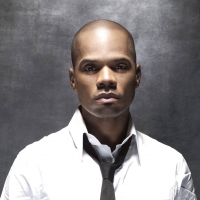
Kirk Dewayne Franklin (born January 26, 1970) is an American gospel musician, choir director, and author. He is known for leading urban contemporary gospel choirs such as The Family, God's Property and One Nation Crew (1NC), and has won multiple awards, including seven Grammy Awards.
Maison Ikkoku

Maison Ikkoku (Japanese: めぞん一刻, Hepburn: Mezon Ikkoku) is a Japanese manga series written and illustrated by Rumiko Takahashi. It was serialized in Big Comic Spirits from November 1980 to April 1987, with the chapters collected into 15 tankōbon volumes by Shogakukan. Maison Ikkoku is a bitter-sweet romantic comedy involving a group of madcap people who live in a boarding house in 1980s Tokyo. The story focuses primarily on the gradually developing relationships between Yusaku Godai, a poor student down on his luck, and Kyoko Otonashi, a young, recently widowed boarding house manager.
Traditional

Bobby Militello
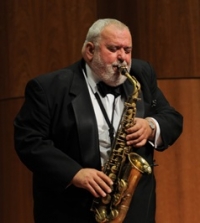
Robert Philip Militello a.k.a. Bobby M. is an American jazz saxophonist and flautist who was a member of the Dave Brubeck Quartet.
Yuri Peshkov

Yuri Peshkov (1940, Leningrad) - accordionist, composer, teacher.
Secondhand Serenade

Secondhand Serenade is an American acoustic rock solo project fronted by vocalist and guitarist John Vesely. The solo project began in California, USA, in 2004. Vesely has released two studio albums to date under the name Secondhand Serenade, Awake in 2007 and A Twist in My Story in 2008. The debut album used multitrack recording to create the sound of a band using technology, the second album took a different path, using a proper band and an orchestra to establish a more accomplished sound.
The pseudonym Secondhand Serenade is a reference to the way in which his songs are 'serenades' sung to his wife. People around the world are merely getting to hear the songs 'second-hand'.
The pseudonym Secondhand Serenade is a reference to the way in which his songs are 'serenades' sung to his wife. People around the world are merely getting to hear the songs 'second-hand'.
Supertramp

Supertramp were a British progressive rock band that released a series of top-selling albums in the 1970s and early 1980s.
Their early music included ambitious concept albums, from which were drawn a number of hits including "Goodbye Stranger", "Bloody Well Right", "The Logical Song", "Breakfast in America", "Dreamer", "Give a Little Bit", "It's Raining Again", and "Take the Long Way Home". Supertramp attained superstardom in the United States, Canada, most of Europe, South Africa, Australia and Brazil, although they were not quite as popular in their home country, the UK. Nonetheless, the album Breakfast in America was a big hit there, reaching number three on the UK charts and featuring two top 10 singles.
Their early music included ambitious concept albums, from which were drawn a number of hits including "Goodbye Stranger", "Bloody Well Right", "The Logical Song", "Breakfast in America", "Dreamer", "Give a Little Bit", "It's Raining Again", and "Take the Long Way Home". Supertramp attained superstardom in the United States, Canada, most of Europe, South Africa, Australia and Brazil, although they were not quite as popular in their home country, the UK. Nonetheless, the album Breakfast in America was a big hit there, reaching number three on the UK charts and featuring two top 10 singles.
Cannonball Adderley

Julian Edwin "Cannonball" Adderley was an American jazz alto saxophonist of the hard bop era of the 1950s and 1960s. Adderley is remembered for his 1966 soul jazz single "Mercy, Mercy, Mercy", a crossover hit on the pop charts
Guns N' Roses

Guns N 'Roses is an American rock band founded in 1985 in Los Angeles, California. Axl Rose, Slash, Izzy Stradlin, Duff McKagan, and Steven , Genres: Hard rock, Heavy metal, Blues rock, Glam rock They started their music life in Los Angeles, California, USA (1985) Albums: Appetite for Destruction, Use Your Illusion I
Dexter Gordon

Dexter Gordon (February 27, 1923 – April 25, 1990) was an American jazz tenor saxophonist. He was among the earliest tenor players to adapt the bebop musical language of people such as Charlie Parker, Dizzy Gillespie, and Bud Powell to the instrument. Gordon's height was 6 feet 6 inches (198 cm), so he was also known as "Long Tall Dexter" and "Sophisticated Giant". His studio and performance career spanned over 40 years.
Gordon's sound was commonly characterized as being "large" and spacious and he had a tendency to play behind the beat. He was famous for humorously inserting musical quotes into his solos. One of his major influences was Lester Young. Gordon, in turn, was an early influence on John Coltrane and Sonny Rollins. Rollins and Coltrane then influenced Gordon's playing as he explored hard bop and modal playing during the 1960s.
Gordon was known for his genial and humorous stage presence. He was an advocate of playing to communicate with the audience. One of his idiosyncratic rituals was to recite lyrics from each ballad before playing it.
A photograph by Herman Leonard of Gordon taking a smoke break at the Royal Roost in 1948 is one of the iconic images in jazz photography. Cigarettes were a recurring theme on covers of Gordon's albums.
Gordon was nominated for an Academy Award for Best Actor in a Leading Role for his performance in the Bertrand Tavernier film Round Midnight (Warner Bros, 1986), and he won a Grammy for Best Jazz Instrumental Performance, Soloist, for the soundtrack album The Other Side of Round Midnight (Blue Note Records, 1986). He also had a cameo role in the 1990 movie Awakenings.
Gordon's sound was commonly characterized as being "large" and spacious and he had a tendency to play behind the beat. He was famous for humorously inserting musical quotes into his solos. One of his major influences was Lester Young. Gordon, in turn, was an early influence on John Coltrane and Sonny Rollins. Rollins and Coltrane then influenced Gordon's playing as he explored hard bop and modal playing during the 1960s.
Gordon was known for his genial and humorous stage presence. He was an advocate of playing to communicate with the audience. One of his idiosyncratic rituals was to recite lyrics from each ballad before playing it.
A photograph by Herman Leonard of Gordon taking a smoke break at the Royal Roost in 1948 is one of the iconic images in jazz photography. Cigarettes were a recurring theme on covers of Gordon's albums.
Gordon was nominated for an Academy Award for Best Actor in a Leading Role for his performance in the Bertrand Tavernier film Round Midnight (Warner Bros, 1986), and he won a Grammy for Best Jazz Instrumental Performance, Soloist, for the soundtrack album The Other Side of Round Midnight (Blue Note Records, 1986). He also had a cameo role in the 1990 movie Awakenings.
Marvin Hamlisch

Marvin Frederick Hamlisch (June 2, 1944 – August 6, 2012) was an American composer and conductor. Hamlisch was one of only sixteen people to win Emmy, Grammy, Oscar and Tony awards. This collection of all four is referred to as an "EGOT". He is one of only two people (along with composer Richard Rodgers) to have won those four prizes and a Pulitzer Prize ("PEGOT").
Fernando Mattos
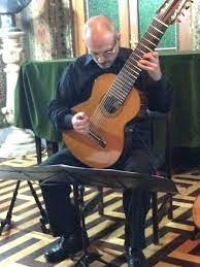
Fernando Lewis de Mattos (Porto Alegre, November 12, 1963 - Porto Alegre, November 4, 2018) was a Brazilian composer, arranger, teacher and music scholar.
He studied music at the Federal University of Rio Grande do Sul, joined its faculty in 1987 and later obtained a master's degree in 1997 with the dissertation A Salamanca do Jarau by Luiz Cosme: Musical Analysis and History of Critical Reception, obtaining maximum grade. His doctoral thesis also focused on the production of Luiz Cosme, entitled Aesthetics and Music in the Work of Luiz Cosme.
He studied music at the Federal University of Rio Grande do Sul, joined its faculty in 1987 and later obtained a master's degree in 1997 with the dissertation A Salamanca do Jarau by Luiz Cosme: Musical Analysis and History of Critical Reception, obtaining maximum grade. His doctoral thesis also focused on the production of Luiz Cosme, entitled Aesthetics and Music in the Work of Luiz Cosme.
Real Book

The Real Book refers to compilations of lead sheets for jazz standards. It usually refers to the first volume of a series of books transcribed and collated by Berklee College of Music students during the 1970s.The name is derived from "fake books", so called because they contained only rough outlines of music pieces rather than fully notated scores. Early fake books were often used by professional bands who performed mostly standards, often more geared to society and dance bands rather than jazz ensembles, and devoted much space to show tunes, novelty tunes, traditional jazz, etc. The first three Real Book volumes, in contrast, contained many bebop and other jazz standards that were likely to be encountered on jazz gigs at the time. For this reason, the books were quickly adopted among jazz players in the 1970s, particularly on the east coast.
Irene Grandi

Irene Grandi is an Italian singer and songwriter. During her career she has sung in Spanish and has performed duets in German, French, Indian and in African languages, selling around 5 million records and earning 9 top-ten albums and 6 top-ten singles of which one number-one on the Italian music charts.
Curtis Stephan
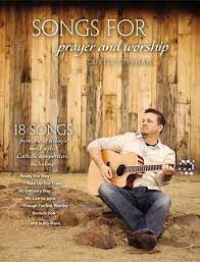
Curtis Stephan Musical artist Albums: Mass of St. Kilian, Let Us All Rejoice, Amid Passing Things, Age to Age, Choose Christ 2020: Mass of Renewal Songs Ready the Way Amid Passing Things · 2012 Miracle of Grace Amid Passing Things · 2012
Scott Alan

cott Alan is an American songwriter who has released eight albums, beginning with his debut album Dreaming Wide Awake.[2
Aerosmith

Aerosmith is an American hard rock band, sometimes referred to as "The Bad Boys from Boston" The band was formed in Boston, Massachusetts in 1970. Guitarist Joe Perry and bassist Tom Hamilton, originally in a band together called the Jam Band, met up with singer Steven Tyler, drummer Joey Kramer, and guitarist Ray Tabano, and formed Aerosmith. By 1971, Tabano was replaced by Brad Whitford, and the band began developing a following in Boston.
They were signed to Columbia Records in 1972 and released a string of multi-platinum albums, beginning with their 1973 eponymous debut album. In 1975, the band broke into the mainstream with the album Toys in the Attic, and their 1976 follow-up Rocks cemented their status as hard rock superstars. The band did not fare well between 1980 and 1984, releasing a lone album, Rock in a Hard Place, which only went gold, failing to match the successes of their previous efforts.
Although Perry and Whitford returned in 1984 and the band signed a new deal with Geffen Records, it wasn't until the band sobered up and released 1987's Permanent Vacation that they regained the level of popularity they had experienced in the 1970s. After 38 years of performing, the band continues to tour and record music.
They were signed to Columbia Records in 1972 and released a string of multi-platinum albums, beginning with their 1973 eponymous debut album. In 1975, the band broke into the mainstream with the album Toys in the Attic, and their 1976 follow-up Rocks cemented their status as hard rock superstars. The band did not fare well between 1980 and 1984, releasing a lone album, Rock in a Hard Place, which only went gold, failing to match the successes of their previous efforts.
Although Perry and Whitford returned in 1984 and the band signed a new deal with Geffen Records, it wasn't until the band sobered up and released 1987's Permanent Vacation that they regained the level of popularity they had experienced in the 1970s. After 38 years of performing, the band continues to tour and record music.
Bob Moses
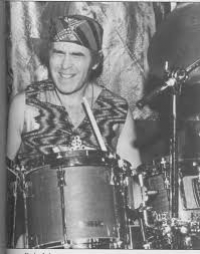
Bob Moses (born January 28, 1948) is an American jazz drummer.Moses played with Roland Kirk in 1964–65 while he was still a teenager. In 1966 he and Larry Coryell formed The Free Spirits, a jazz fusion ensemble, and from 1967 to 1969 he played in Gary Burton's quartet. He played on the landmark 1967 Burton album A Genuine Tong Funeral, but due to creative disputes with the album's composer Carla Bley the drummer was credited as "Lonesome Dragon". Moses and Bley would later reconcile and he became a vocal booster for her music.
The Police

The Police were a three-piece rock band consisting of Sting (vocals, bass guitar), Andy Summers (guitar, vocals) and Stewart Copeland (drums, percussion, vocals). The band became globally popular in the early 1980s, playing a style of rock that was influenced by jazz, punk and reggae music. Their 1983 album, Synchronicity, was number one in the UK and the US and sold over 8,000,000 copies in the US. The band broke up in 1984, but reunited in early 2007 for a one-off world tour lasting until August 2008, in celebration of the 30th anniversary of their hit single "Roxanne" and also, to a lesser extent, that of their formation as a group. To date, The Police have sold more than 50 million albums worldwide. Rolling Stone ranked The Police number 70 on their list of the 100 Greatest Artists of All Time.
Jason Robert Brown
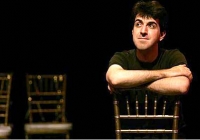
Jason Robert Brown (born 1970 in Ossining, New York) is an American musical theater composer and lyricist. Often cited as one of the "New School" of theatrical composers (a list that includes Michael John LaChiusa, Adam Guettel, Andrew Lippa, and Jeanine Tesori, among others), Brown's music sensibility fuses pop-rock stylings with theatrical lyrics. An accomplished pianist, Brown has often served as music director, conductor, orchestrator and pianist for his own productions.
Alex Kapranos

Alexander Paul Kapranos Huntley (born 20 March 1972) is a Scottish musician, singer, songwriter, record producer, and author. He is best known as the lead singer and guitarist of Scottish rock band Franz Ferdinand. He has also been a part of the supergroups FFS and BNQT.
Cat Stevens

Yusuf Islam, (born Steven Demetre Georgiou on 21 July 1948), best known by his former stage name Cat Stevens, is a British musician of Greek Cypriot and Swedish ancestry. He is a singer-songwriter, multi-instrumentalist, educator, philanthropist and prominent convert to Islam.
As Cat Stevens, he sold over 60 million albums around the world since the late 1960s. His albums Tea for the Tillerman and Teaser and the Firecat were both certified as Triple Platinum by the RIAA in the United States (three million sales each); his album Catch Bull at Four sold half a million copies in the first two weeks of release alone, and was Billboard's number-one LP for three consecutive weeks. His songwriting has also earned him two ASCAP songwriting awards for "The First Cut Is the Deepest," which has been a hit single for five different artists, and has been instrumental for others in establishing their musical careers.
Stevens converted to Islam at the height of his fame in 1977. The following year, he adopted his Muslim name Yusuf Islam, sold all his instruments and awards for charity, and left his music career to devote himself to educational and philanthropic causes in the Muslim community. He turned to his mother to help him decide the best candidate to wed, and thus, in an arranged marriage, took his vows with Fauzia Mubarak Ali, eventually producing five living children from the union.
He has been given several awards for his work in promoting peace in the world, including 2003's World Award, the 2004 Man for Peace award, and the 2007 Mediterranean Prize for Peace. In 2006, he returned to pop music, with his first album of new pop songs in 28 years, entitled An Other Cup.
He lives with his wife, children and grand-child in London. Yusuf Islam spends part of each year in Dubai.
As Cat Stevens, he sold over 60 million albums around the world since the late 1960s. His albums Tea for the Tillerman and Teaser and the Firecat were both certified as Triple Platinum by the RIAA in the United States (three million sales each); his album Catch Bull at Four sold half a million copies in the first two weeks of release alone, and was Billboard's number-one LP for three consecutive weeks. His songwriting has also earned him two ASCAP songwriting awards for "The First Cut Is the Deepest," which has been a hit single for five different artists, and has been instrumental for others in establishing their musical careers.
Stevens converted to Islam at the height of his fame in 1977. The following year, he adopted his Muslim name Yusuf Islam, sold all his instruments and awards for charity, and left his music career to devote himself to educational and philanthropic causes in the Muslim community. He turned to his mother to help him decide the best candidate to wed, and thus, in an arranged marriage, took his vows with Fauzia Mubarak Ali, eventually producing five living children from the union.
He has been given several awards for his work in promoting peace in the world, including 2003's World Award, the 2004 Man for Peace award, and the 2007 Mediterranean Prize for Peace. In 2006, he returned to pop music, with his first album of new pop songs in 28 years, entitled An Other Cup.
He lives with his wife, children and grand-child in London. Yusuf Islam spends part of each year in Dubai.
Gummy

Park Ji-yeon, better known by her stage name Gummy, is a South Korean singer. She debuted in 2003 with the album Like Them and has since become known for her soundtrack appearances.
Leos Janacek

Leoš Janáček (Czech pronunciation: ( listen)) (baptised Leo Eugen Janáček) (July 3, 1854 – August 12, 1928), was a Czech composer, musical theorist, folklorist, publicist and teacher. He was inspired by Moravian and all Slavic folk music to create an original, modern musical style. Until 1895 he devoted himself mainly to folkloristic research and his early musical output was influenced by contemporaries such as Antonín Dvořák. His later, mature works incorporate his earlier studies of national folk music in a modern, highly original synthesis, first evident in the opera Jenůfa, which was premiered in 1904 in Brno. The success of Jenůfa (often called the "Moravian national opera") at Prague in 1916 gave Janáček access to the world's great opera stages. Janáček's later works are his most celebrated. They include the symphonic poem Sinfonietta, the oratorial Glagolitic Mass, the rhapsody Taras Bulba, string quartets, other chamber works and operas. He is considered to rank with Antonín Dvořák and Bedřich Smetana, as one of the most important Czech composers.
Bach

Johann Sebastian Bach (31 March 1685 – 28 July 1750) was a German composer and organist whose sacred and secular works for choir, orchestra, and solo instruments drew together the strands of the Baroque period and brought it to its ultimate maturity. Although he introduced no new forms, he enriched the prevailing German style with a robust contrapuntal technique, an unrivalled control of harmonic and motivic organisation in composition for diverse musical forces, and the adaptation of rhythms and textures from abroad, particularly Italy and France.
Revered for their intellectual depth and technical and artistic beauty, Bach's works include the Brandenburg concertos; the Goldberg Variations; the English Suites, French Suites, Partitas, and Well-Tempered Clavier; the Mass in B Minor; the St. Matthew Passion; the St. John Passion; The Musical Offering; The Art of Fugue; the Sonatas and Partitas for violin solo; the Cello Suites; more than 200 surviving cantatas; and a similar number of organ works, including the celebrated Toccata and Fugue in D Minor.
While Bach's fame as an organist was great during his lifetime, he was not particularly well-known as a composer. His adherence to Baroque forms and contrapuntal style was considered "old-fashioned" by his contemporaries, especially late in his career when the musical fashion tended towards Rococo and later Classical styles. A revival of interest and performances of his music began early in the 19th century, and he is now widely considered to be one of the greatest composers in the Western tradition.
Revered for their intellectual depth and technical and artistic beauty, Bach's works include the Brandenburg concertos; the Goldberg Variations; the English Suites, French Suites, Partitas, and Well-Tempered Clavier; the Mass in B Minor; the St. Matthew Passion; the St. John Passion; The Musical Offering; The Art of Fugue; the Sonatas and Partitas for violin solo; the Cello Suites; more than 200 surviving cantatas; and a similar number of organ works, including the celebrated Toccata and Fugue in D Minor.
While Bach's fame as an organist was great during his lifetime, he was not particularly well-known as a composer. His adherence to Baroque forms and contrapuntal style was considered "old-fashioned" by his contemporaries, especially late in his career when the musical fashion tended towards Rococo and later Classical styles. A revival of interest and performances of his music began early in the 19th century, and he is now widely considered to be one of the greatest composers in the Western tradition.
Frank Sinatra

Francis Albert "Frank" Sinatra (December 12, 1915 â May 14, 1998) was an American singer and actor.
Beginning his musical career in the swing era with Harry James and Tommy Dorsey, Sinatra became a solo artist with great success in the early to mid-1940s, being the idol of the "bobby soxers". His professional career had stalled by the 1950s, but it was reborn in 1954 after he won the Academy Award for Best Supporting Actor.
He signed with Capitol Records and released several critically lauded albums (such as In the Wee Small Hours, Songs for Swingin' Lovers, Come Fly with Me, Only the Lonely and Nice 'n' Easy). Sinatra left Capitol to found his own record label, Reprise Records (finding success with albums such as Ring-A-Ding-Ding, Sinatra at the Sands and Francis Albert Sinatra & Antonio Carlos Jobim), toured internationally, and fraternized with the Rat Pack and President John F. Kennedy in the early 1960s. Sinatra turned 50 in 1965, recorded the retrospective September of My Years, starred in the Emmy-winning television special Frank Sinatra: A Man and His Music, and scored hits with "Strangers in the Night" and "My Way".
Sinatra attempted to weather the changing tastes in popular music, but with dwindling album sales and after appearing in several poorly received films, he retired in 1971. Coming out of retirement in 1973, he recorded several albums, scoring a hit with "(Theme From) New York, New York" in 1980, and toured both within the United States and internationally until a few years before his death in 1998.
Sinatra also forged a career as a dramatic actor, winning the Academy Award for Best Supporting Actor for his performance in From Here to Eternity, and he was nominated for the Academy Award for Best Actor for The Man with the Golden Arm. His also starred in such musicals as High Society, Pal Joey, Guys and Dolls and On the Town. Sinatra was honored with the Kennedy Center Honors in 1983 and awarded the Presidential Medal of Freedom by Ronald Reagan in 1985 and the Congressional Gold Medal in 1997. Sinatra was also the recipient of eleven Grammy Awards, including the Grammy Trustees Award, Grammy Legend Award and the Grammy Lifetime Achievement Award.
Beginning his musical career in the swing era with Harry James and Tommy Dorsey, Sinatra became a solo artist with great success in the early to mid-1940s, being the idol of the "bobby soxers". His professional career had stalled by the 1950s, but it was reborn in 1954 after he won the Academy Award for Best Supporting Actor.
He signed with Capitol Records and released several critically lauded albums (such as In the Wee Small Hours, Songs for Swingin' Lovers, Come Fly with Me, Only the Lonely and Nice 'n' Easy). Sinatra left Capitol to found his own record label, Reprise Records (finding success with albums such as Ring-A-Ding-Ding, Sinatra at the Sands and Francis Albert Sinatra & Antonio Carlos Jobim), toured internationally, and fraternized with the Rat Pack and President John F. Kennedy in the early 1960s. Sinatra turned 50 in 1965, recorded the retrospective September of My Years, starred in the Emmy-winning television special Frank Sinatra: A Man and His Music, and scored hits with "Strangers in the Night" and "My Way".
Sinatra attempted to weather the changing tastes in popular music, but with dwindling album sales and after appearing in several poorly received films, he retired in 1971. Coming out of retirement in 1973, he recorded several albums, scoring a hit with "(Theme From) New York, New York" in 1980, and toured both within the United States and internationally until a few years before his death in 1998.
Sinatra also forged a career as a dramatic actor, winning the Academy Award for Best Supporting Actor for his performance in From Here to Eternity, and he was nominated for the Academy Award for Best Actor for The Man with the Golden Arm. His also starred in such musicals as High Society, Pal Joey, Guys and Dolls and On the Town. Sinatra was honored with the Kennedy Center Honors in 1983 and awarded the Presidential Medal of Freedom by Ronald Reagan in 1985 and the Congressional Gold Medal in 1997. Sinatra was also the recipient of eleven Grammy Awards, including the Grammy Trustees Award, Grammy Legend Award and the Grammy Lifetime Achievement Award.
Dave Brubeck

David Warren Brubeck (born December 6, 1920 in Concord, California), better known as Dave Brubeck, is an American jazz pianist. Regarded as a genius in his field, he has written a number of jazz standards, including "In Your Own Sweet Way" and "The Duke". Brubeck's style ranges from refined to bombastic, reflecting his mother's attempts at classical training and his improvisational skills. Much of his music employs unusual time signatures.
His long-time musical partner, alto saxophonist Paul Desmond, wrote the Dave Brubeck Quartet's most famous piece, "Take Five", which is in 5/4 time and has endured as a jazz classic. Brubeck experimented with time signatures through much of his career, recording "Pick Up Sticks" in 6/4, "Unsquare Dance" in 7/4, and "Blue Rondo à la Turk" in 9/8. He also provided music for the TV animated miniseries "This Is America, Charlie Brown".
His long-time musical partner, alto saxophonist Paul Desmond, wrote the Dave Brubeck Quartet's most famous piece, "Take Five", which is in 5/4 time and has endured as a jazz classic. Brubeck experimented with time signatures through much of his career, recording "Pick Up Sticks" in 6/4, "Unsquare Dance" in 7/4, and "Blue Rondo à la Turk" in 9/8. He also provided music for the TV animated miniseries "This Is America, Charlie Brown".
Isao Sasaki

Isao Sasaki (ささき いさお(佐々木 功), Sasaki Isao, born May 16, 1942) is a Japanese actor, voice actor, and singer.
He has had voice roles in anime such as Legend of the Galactic Heroes, Space Battleship Yamato, and Gatchaman. He has also performed the opening themes for anime such as Yamato, Star of the Giants, Getter Robo, Casshern, Grendizer, Gaiking and tokusatsu series such as Himitsu Sentai Gorenger, J.A.K.Q. Dengekitai, Choujinki Metalder, and most recently Tokusou Sentai Dekaranger. He has also had an acting role in the tokusatsu film Kamen Rider ZO, OOO, Den-O, All Riders: Let's Go Kamen Riders and in the series Kyojuu Tokusou Juspion. He is the official dub voice of Sylvester Stallone, and Christopher Reeve's Clark Kent and Superman in the film series, until he was replaced by Hiroki Tōchi for Superman Returns.
He has had voice roles in anime such as Legend of the Galactic Heroes, Space Battleship Yamato, and Gatchaman. He has also performed the opening themes for anime such as Yamato, Star of the Giants, Getter Robo, Casshern, Grendizer, Gaiking and tokusatsu series such as Himitsu Sentai Gorenger, J.A.K.Q. Dengekitai, Choujinki Metalder, and most recently Tokusou Sentai Dekaranger. He has also had an acting role in the tokusatsu film Kamen Rider ZO, OOO, Den-O, All Riders: Let's Go Kamen Riders and in the series Kyojuu Tokusou Juspion. He is the official dub voice of Sylvester Stallone, and Christopher Reeve's Clark Kent and Superman in the film series, until he was replaced by Hiroki Tōchi for Superman Returns.
4Men

4Men (Korean: 포맨) is a South Korean R&B group formed in 1998. The group consists of two members: Shin Yong-jae and Kim Won-joo.Originally a four-member group composed of Yoon Min-soo, Jeong Se-young, Han Hyeon-hee and Lee Jeong-ho, 4Men released their debut album Four Men First Album on February 1, 1998. Two years later, they released their second album Ireoke Cheonildongan Moeumyeon Ibyeori Sarajindago Haetda on December 29, 2000. In 2001, Yoon Min-soo withdrew from the group and 4Men continued promotions as a three-member group until J1 joined the group in 2006. In 2008, all members withdrew from the group. However, following later that year, the group was revamped with three new members: Shin Yong-jae, Kim Young-jae and Kim Won-joo. 4Men currently promotes as a duo after Kim Young-jae's withdrawal from the group in 2014.
Big Bang

Big Bang (Korean: 빅뱅), commonly stylized as BIGBANG, is a Korean boyband made up of five Korean singers. Although their debut was somewhat successful, it was not until the release of "거짓말" ("Lies") that the group gained mainstream success.
Big Bang's music style can be classified for the most part as hip pop music (as seen with the songs "La, La, La" and "Goodbye Baby"), with a little vibe of R&B (as seen with the songs "We Belong Together" and "Forever With You"), dance ("Shake It") and mainstream ("This Love") music. Rock with "Oh My Friend". Finally, becoming the greatest hit songs of 2007, (as seen with the songs "Lies", "Last Farewell", and "Haru Haru (Day By Day)") electronica is seemingly becoming the new music trend in Korea. However, the members have branched out into different genres in their solo work, including singing ballads and mainstream pop music. Big Bang even once mentioned in an interview that if they want to, they might do trot someday. Daesung's first digital single, "Look at Me, GwiSun" ("날 봐, 귀순"), was a trot song, which had been somewhat controversial considering Big Bang's primary focus on hip-hop.
The members of Big Bang often contribute to writing lyrics for their own music as well as composing despite only debuting in 2006. The most notable from the group to compose and write is leader G-Dragon, as he has composed and written numerous songs for the group, including "Lies" and "Last Farewell." Aside from G-Dragon, the others members have contributed to writing lyrics as well. T.O.P has also written a song for their third mini album Stand up, called "Good Man". On a whole, Big Bang has received praises from critics, fans, and other singers alike for contributions to their own materials.
Big Bang's music style can be classified for the most part as hip pop music (as seen with the songs "La, La, La" and "Goodbye Baby"), with a little vibe of R&B (as seen with the songs "We Belong Together" and "Forever With You"), dance ("Shake It") and mainstream ("This Love") music. Rock with "Oh My Friend". Finally, becoming the greatest hit songs of 2007, (as seen with the songs "Lies", "Last Farewell", and "Haru Haru (Day By Day)") electronica is seemingly becoming the new music trend in Korea. However, the members have branched out into different genres in their solo work, including singing ballads and mainstream pop music. Big Bang even once mentioned in an interview that if they want to, they might do trot someday. Daesung's first digital single, "Look at Me, GwiSun" ("날 봐, 귀순"), was a trot song, which had been somewhat controversial considering Big Bang's primary focus on hip-hop.
The members of Big Bang often contribute to writing lyrics for their own music as well as composing despite only debuting in 2006. The most notable from the group to compose and write is leader G-Dragon, as he has composed and written numerous songs for the group, including "Lies" and "Last Farewell." Aside from G-Dragon, the others members have contributed to writing lyrics as well. T.O.P has also written a song for their third mini album Stand up, called "Good Man". On a whole, Big Bang has received praises from critics, fans, and other singers alike for contributions to their own materials.
Jeno Hubay

Jenő Hubay, Jenő Hubay von Szalatna, Hungarian: szalatnai Hubay Jenő (Hungarian pronunciation: ; 15 September 1858 – 12 March 1937), also known by his German name Eugen Huber (pronounced ), was a Hungarian violinist, composer and music teacher.
Jean Renard
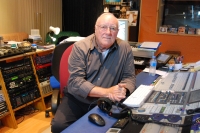
Jean Renard, born in Provins on December 4, 1933, is a French songwriter, artistic director and producer.
He wrote many French song hitsAs a child, Jean Renard was passionate about music. He learned the harmonica, pipe, clarinet and piano. At 16, he abandoned his studies and worked with his father in the family painting business. During this period, he composed his first song named Roseline which he submitted to the publisher Rudy Revil, who offered it to a German conductor. The singer Brenda Lee, finally, recorded it under the title Losing You in 1963. Adapted in French, the song, interpreted by Tino Rossi and / then Colette Deréal, becomes Connais-tu? and by Maria Candido Mon ange.
He wrote many French song hitsAs a child, Jean Renard was passionate about music. He learned the harmonica, pipe, clarinet and piano. At 16, he abandoned his studies and worked with his father in the family painting business. During this period, he composed his first song named Roseline which he submitted to the publisher Rudy Revil, who offered it to a German conductor. The singer Brenda Lee, finally, recorded it under the title Losing You in 1963. Adapted in French, the song, interpreted by Tino Rossi and / then Colette Deréal, becomes Connais-tu? and by Maria Candido Mon ange.
Franz Schubert

Franz Peter Schubert (German pronunciation: ; January 31, 1797 – November 19, 1828) was an Austrian composer. He wrote some 600 Lieder, nine symphonies (including the famous "Unfinished Symphony"), liturgical music, operas, some incidental music, and a large body of chamber and solo piano music. He is particularly noted for his original melodic and harmonic writing.
Schubert was born into a musical family, and received formal musical training through much of his childhood. While Schubert had a close circle of friends and associates who admired his work (amongst them the prominent singer Johann Michael Vogl), wide appreciation of his music during his lifetime was limited at best. He was never able to secure adequate permanent employment, and for most of his career he relied on the support of friends and family. He made some money from published works, and occasionally gave private musical instruction. In the last year of his life he began to receive wider acclaim. He died at the age of 31 of "typhoid fever", a diagnosis which was vague at the time; several scholars suspect the real illness was tertiary syphilis.
Interest in Schubert's work increased dramatically in the decades following his death. Composers like Franz Liszt, Robert Schumann and Felix Mendelssohn discovered, collected, and championed his works in the 19th century, as did musicologist Sir George Grove. Franz Schubert is now widely considered to be one of the greatest composers in the Western tradition.
Schubert was born into a musical family, and received formal musical training through much of his childhood. While Schubert had a close circle of friends and associates who admired his work (amongst them the prominent singer Johann Michael Vogl), wide appreciation of his music during his lifetime was limited at best. He was never able to secure adequate permanent employment, and for most of his career he relied on the support of friends and family. He made some money from published works, and occasionally gave private musical instruction. In the last year of his life he began to receive wider acclaim. He died at the age of 31 of "typhoid fever", a diagnosis which was vague at the time; several scholars suspect the real illness was tertiary syphilis.
Interest in Schubert's work increased dramatically in the decades following his death. Composers like Franz Liszt, Robert Schumann and Felix Mendelssohn discovered, collected, and championed his works in the 19th century, as did musicologist Sir George Grove. Franz Schubert is now widely considered to be one of the greatest composers in the Western tradition.
Leo Brouwer

Juan Leovigildo Brouwer Mezquida (born March 1, 1939) in Havana, is a Cuban composer, conductor and guitarist .
As a child, Brouwer received his initial stimulus from his father, a physician, who was an aficionado of Villa-Lobos, Tárrega and Granados. He initiated his son encouraging him to play these composers' works, mostly by ear.
Young Brouwer received his first formal guitar instruction from the noted Cuban guitarist and pedagogue Isaac Nicola, in turn a disciple of Emilio Pujol. Afterwards, Brouwer went to the United States to study music at the Hartt College of Music of the University of Hartford, and later at the Juilliard School, where he studied under Vincent Persichetti and took composition classes with Stefan Wolpe.
Brouwer's early works show the influence of Cuban folk music, but during the 1960s and 70s, he became interested in the music of modernist composers such as Luigi Nono and Iannis Xenakis, using indeterminacy in works such as Sonograma I. Other works from this period include the guitar pieces Canticum (1968), La espiral eterna (1971), Parábola (1973) and Tarantos (1974). More recently, Brouwer's works have started leaning towards tonality and modality. The solo guitar works El Decamerón Negro (1981) the Sonata (1990; for Julian Bream) and Paisaje cubano con campanas (1986) exemplify this tendency.
Among his works are a large number of solo guitar pieces, several guitar concertos and over forty film scores. Leo Brouwer is involved in the "Concurso y Festival Internacional de Guitarra de la Habana" (International Guitar Festival of the Havana). He travels often to attend guitar festivals throughout the world, and especially to other Latin American countries.
As a child, Brouwer received his initial stimulus from his father, a physician, who was an aficionado of Villa-Lobos, Tárrega and Granados. He initiated his son encouraging him to play these composers' works, mostly by ear.
Young Brouwer received his first formal guitar instruction from the noted Cuban guitarist and pedagogue Isaac Nicola, in turn a disciple of Emilio Pujol. Afterwards, Brouwer went to the United States to study music at the Hartt College of Music of the University of Hartford, and later at the Juilliard School, where he studied under Vincent Persichetti and took composition classes with Stefan Wolpe.
Brouwer's early works show the influence of Cuban folk music, but during the 1960s and 70s, he became interested in the music of modernist composers such as Luigi Nono and Iannis Xenakis, using indeterminacy in works such as Sonograma I. Other works from this period include the guitar pieces Canticum (1968), La espiral eterna (1971), Parábola (1973) and Tarantos (1974). More recently, Brouwer's works have started leaning towards tonality and modality. The solo guitar works El Decamerón Negro (1981) the Sonata (1990; for Julian Bream) and Paisaje cubano con campanas (1986) exemplify this tendency.
Among his works are a large number of solo guitar pieces, several guitar concertos and over forty film scores. Leo Brouwer is involved in the "Concurso y Festival Internacional de Guitarra de la Habana" (International Guitar Festival of the Havana). He travels often to attend guitar festivals throughout the world, and especially to other Latin American countries.
Anton Webern

Anton Webern (3 December 1883 – 15 September 1945) was an Austrian composer and conductor. He was a member of the Second Viennese School. As a student and significant follower of Arnold Schoenberg, he became one of the best-known exponents of the twelve-tone technique; in addition, his innovations regarding schematic organization of pitch, rhythm and dynamics were formative in the musical technique later known as total serialism.
Saturday Night Fever

Saturday Night Fever is a 1977 film starring John Travolta as Tony Manero, a troubled Brooklyn youth whose weekend activities are dominated by visits to a local discothèque. While in the disco, Tony is the king, and the visits help him to temporarily forget the reality of his life: a dead-end job, clashes with his unsupportive and squabbling parents, tensions in the local community, and his associations with a gang of dead-beat friends.
A huge commercial success, the movie significantly helped to popularize disco music around the world and made Travolta a household name. The Saturday Night Fever soundtrack, featuring disco songs by the Bee Gees, became the best selling soundtrack at that time and held the record until 1999 when soundtrack to The Bodyguard overtook it. The film is also notable for being one of the first instances of cross-media marketing, with the tie-in soundtrack's single being used to help promote the film before its release and the film popularizing the entire soundtrack after its release.
The story is based upon a 1976 New York magazine article by British writer Nik Cohn, "Tribal Rites of the New Saturday Night." In the late-1990s, Cohn acknowledged that the article had been fabricated. A newcomer to the United States and a stranger to the disco lifestyle, Cohn was unable to make any sense of the subculture he had been assigned to write about. The characters who were to become Tony Manero and his friends sprang almost completely from his imagination. The film also showcased aspects of the music, the dancing, and the subculture surrounding the disco era: symphony-orchestrated melodies, haute-couture styles of clothing, sexual promiscuity, and graceful choreography.
A huge commercial success, the movie significantly helped to popularize disco music around the world and made Travolta a household name. The Saturday Night Fever soundtrack, featuring disco songs by the Bee Gees, became the best selling soundtrack at that time and held the record until 1999 when soundtrack to The Bodyguard overtook it. The film is also notable for being one of the first instances of cross-media marketing, with the tie-in soundtrack's single being used to help promote the film before its release and the film popularizing the entire soundtrack after its release.
The story is based upon a 1976 New York magazine article by British writer Nik Cohn, "Tribal Rites of the New Saturday Night." In the late-1990s, Cohn acknowledged that the article had been fabricated. A newcomer to the United States and a stranger to the disco lifestyle, Cohn was unable to make any sense of the subculture he had been assigned to write about. The characters who were to become Tony Manero and his friends sprang almost completely from his imagination. The film also showcased aspects of the music, the dancing, and the subculture surrounding the disco era: symphony-orchestrated melodies, haute-couture styles of clothing, sexual promiscuity, and graceful choreography.
Mozart

Wolfgang Amadeus Mozart, full name Johann Chrysostom Wolfgang Amadeus Mozart (27 January 1756 â 5 December 1791) was a prolific and influential composer of the Classical era. His over 600 compositions include works widely acknowledged as pinnacles of symphonic, concertante, chamber, piano, operatic, and choral music. Mozart is among the most enduringly popular of classical composers, and many of his works are part of the standard concert repertoire.
Mozart's music, like Haydn's, stands as an archetypal example of the Classical style. His works spanned the period during which that style transformed from one exemplified by the style galant to one that began to incorporate some of the contrapuntal complexities of the late Baroque, complexities against which the galant style had been a reaction. Mozart's own stylistic development closely paralleled the development of the classical style as a whole. In addition, he was a versatile composer and wrote in almost every major genre, including symphony, opera, the solo concerto, chamber music including string quartet and string quintet, and the piano sonata. While none of these genres were new, the piano concerto was almost single-handedly developed and popularized by Mozart. He also wrote a great deal of religious music, including masses; and he composed many dances, divertimenti, serenades, and other forms of light entertainment.
The central traits of the classical style can be identified in Mozart's music. Clarity, balance, and transparency are hallmarks of his work.
Mozart's music, like Haydn's, stands as an archetypal example of the Classical style. His works spanned the period during which that style transformed from one exemplified by the style galant to one that began to incorporate some of the contrapuntal complexities of the late Baroque, complexities against which the galant style had been a reaction. Mozart's own stylistic development closely paralleled the development of the classical style as a whole. In addition, he was a versatile composer and wrote in almost every major genre, including symphony, opera, the solo concerto, chamber music including string quartet and string quintet, and the piano sonata. While none of these genres were new, the piano concerto was almost single-handedly developed and popularized by Mozart. He also wrote a great deal of religious music, including masses; and he composed many dances, divertimenti, serenades, and other forms of light entertainment.
The central traits of the classical style can be identified in Mozart's music. Clarity, balance, and transparency are hallmarks of his work.
Santa Esmeralda

Santa Esmeralda is a U.S./French Disco group formed in the 1970s, which earned a #1 club hit in 1977 with a cover version of the song "Don't Let Me Be Misunderstood".
Jacob do Bandolim

Jacob do Bandolim born Jacob Pick Bittencourt (February 14, 1918 – August 13, 1969) was a Brazilian composer and musician. Born to a Brazilian-Jewish mother and a gentile father in Rio de Janeiro, his stage name means "Mandolin Jacob", after the instrument he played.A perfectionist, Jacob was able to achieve from his band Época de Ouro the highest levels of quality. Jacob hated the stereotype of the "dishevelled, drunk folk musician" and required commitment and impeccable dress from his musicians who, like himself, all held "day jobs." Jacob worked as a pharmacist, insurance salesman, street vendor, and finally notary public, to support himself while also working "full time" as a musician.
Lucas Allen
Allen Lucas, a classical guitar teacher, arranger and performer here in the Philippines, I study classical
guitar at Philippine Women's University taking up Music Teacher Diploma Major in Classical Guitar. aside
from being a classical guitar teacher and performer, I am also a Music Copyist.
guitar at Philippine Women's University taking up Music Teacher Diploma Major in Classical Guitar. aside
from being a classical guitar teacher and performer, I am also a Music Copyist.
Kristen Guenther
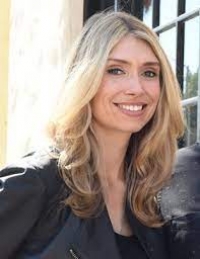
Kirsten Guenther is the recipient of a Richard Rodgers Award, Rockefeller Grant, Dramatist Guild Fellowship, Johnny Mercer Writers Fellowship, and a Lincoln Center Honorarium.
 Sheet Music Port is a site for those who wants to access popular sheet music easily,
letting them download the sheet music for free for trial purposes.
It's completely free to download and try the listed sheet music, but you have to delete the files after 24 hours of trial.
Don't forget, if you like the piece of music you have just learned playing,
treat the artist with respect, and go buy the original sheet music.
Sheet Music Port is a site for those who wants to access popular sheet music easily,
letting them download the sheet music for free for trial purposes.
It's completely free to download and try the listed sheet music, but you have to delete the files after 24 hours of trial.
Don't forget, if you like the piece of music you have just learned playing,
treat the artist with respect, and go buy the original sheet music.